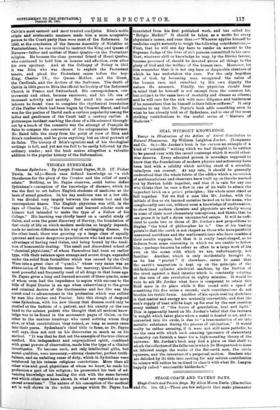THOMAS SYDENHAM.
Thomas Sydenham. By Joseph Frank Payne, M.D. (T. Fisher Unwin. 3s. 6d.)—Bacon once defined knowledge as "a rich Storehouse for the glory of the Creator and the relief of man's estate." Nothing, as Dr. Payne observes, could better define Sydenham's conception of the knowledge of diseases, which he was the first to set before English students of medicine as the basis of sound practice. In his day medicine was at a low ebb. It was divided very largely between the solemn tool and the unscrupulous knave. The English physician was still, in the days of Charles II., "the formal and learned scholar such as Linacre had intended to make the type of a Fellow of his College." His learning was chiefly based on a careful study of Galen, and even the great discovery of Harvey, the foundation of that study of life on which modern medicine so largely depends, made no serious difference in his way of envisaging disease. On the other- hand, there was growing up a large class of equally ignorant and more dangerous practitioners who had not even the advantage of having read Galen, and being bound by the tradi- tion of honourable dealing. The small and discredited school of " chemical physicians," of whom Paracelsus had been an earlier type, with their reliance upon strange and secret drugs, expanded under the relief from formalities which was caused by the Civil Wars into a great class of "quacks," whose very name was an abbreviation of the German name for mercury, Quecksilber, the most powerful and frequently used of all drugs in that loose age. Dr. Payne gives a long and learned account of these quacks, some of whom even had the impudence to aspire with success to the title of Royal Doctor in an age when subserviency to the gross and criminal desires of the Castlemaine and her like was the surest road to advancement in the profession which was sullied by men like Archer and Frazier. Into this slough of despond came Sydenbam, with his new theory that disease could only be studied at the bedside of a patient, and his enmity on the one hand to the solemn pedant who thought that all medical know- ledge was to be found in the sacrosanct pages of Galen, on the other to the noxious humbugs who cared nothing whom they slew, or what constitutions they ruined, so long as money came into their purse. Sydenham's chief title to fame, as Dr. Payne well says, does not rest on his discoveries so much as on his method. "It was that he first set the example of the true clinical method. His independent and unprejudiced spirit, combined with great powers of observation, made him the type of a clinical investigator. To become such, not only intellectual gifts, but moral qualities, were necessary,—strong character, perfect truth- fulness, and an, unfailing sense of duty, which in Sydenham were reinforced by his intense religions convictions. More than all other wise and good physicians of whom we know, he made his profession a part of his religion; he prosecuted his teak of ad- vancing knowledge and healing the sick with the same fervent zeal which other men base shown in what are regarded as more sacred avocations." The nature of his conception of the medical art is well shown in the noble passage which Dr. Payne has
translated from his first published work, and has called his "Religio Medici." It should be taken as a motto for every physician's career, and runs thus :—" Whoever applies himself to medicine ought seriously to weigh the following considerations,— First, that he will one day have to render an account to the Supreme Judge of the lives of sic': persons committed to his care. Next, whatever skill or knowledge he may, by the Divine favour, become possessed of, should be devoted above all things to the glory of God and the welfare of the human race. Moreover, let him remember that it is not any base or despicable creature of which he has undertaken the cure. For the only begotten Son of God, by becoming man, recognised the value of the human race, and ennobled by His own dignity the nature He assumed. Finally, the physician should bear in mind that he himself is not exempt from the common lot, but subject to the same laws of mortality and disease as others ; and he will care for the sick with more diligence and tenderness if he remembers that he himself is their fellow-sufferer." It only remains to say that Dr. Payne's book adds something even to what he has already told us of Sydenham, and is one of the most striking contributions to the useful series of " Masters of Medicine."


















































 Previous page
Previous page